#hamurabi
Explore tagged Tumblr posts
Text

Distracting myself tonight with some image cleanup. If there'd been a computer game industry in 1967, this might've been an ad for the first narrative video game, featuring its Gabe Newell.
(IBM employee Bruse Montcreiff, essentially the producer of The Sumerian Game.)
24 notes
·
View notes
Text
Primeiras Civilizações e o Direito
Primeiras Civilizações e o Direito #historiadodireito #direitonahistoria #direito #codigodehamurabi
1. O Mesolítico Introdução O Mesolítico, ou Idade Média da Pedra, é um período que se estendeu aproximadamente entre 10.000 e 5.000 a.C., marcando uma transição entre o Paleolítico (Idade da Pedra Antiga) e o Neolítico (Idade da Pedra Nova). Essa fase da pré-história é particularmente interessante para os estudiosos do Direito, pois representa um momento crítico de mudanças sociais e culturais…
View On WordPress
#código de hamurabi#direito babilonico#direito dos primeiros povos#direito egípcio#direito na Babilônia#direito na Mesopotamia#direito no Egito Antigo#direito no mesolítico#direito no neolítico#hamurabi#história do direito#neolítico e o direito#ordálio#primeiros códigos#surgimento do direito
0 notes
Text
"A man's gotta have a code"
- Hammurabi, probably
7 notes
·
View notes
Text
I fucking love old law codes, they're literally always like:
no man may take a wife within six degrees of kinship in his own family, nor the widow of one so closely related, nor a close relative of his first wife
nor his godmother, nor a divorcee, nor a nun, nor may he commit adultery
a man may only lie with his wife, for as long she lives, just in case it was unclear what adultery means
Wizards, sorcerers, fortune-tellers and prostitutes must be driven out of the land.
also, we're reforming the coinage.
An end put to all unjust practices such as minting false coins (also incorrect measures and weights, building dangerous houses, lying about goods, criminal conspiracy, etc.)
All criminals shall be put to death unless they swear before various gods that they did not do it.
We will repair the bridges also.
#history#idk why i just LOVE the tone of stuff like this#i think it's very telling that they're all translated in such a similar way#like bro you can stop saying 'verily' i know this was written in middle english/akkadian/sanskrit/whatever#although i will say this summary leaves out my favourite thing about the code of hamurabi#which is its tendency to give a series of extremely specific examples#I'm not saying that doing so is unnecessary!#i'm just saying that the 300th time you press 'If a man has been carried off but' into a tablet must hit hard
6 notes
·
View notes
Text
And what's this ? It's Gram with the code of Hamurabi !
3 notes
·
View notes
Text
Coerção, Capital e Estados Europeus por Charles Tilly - Capítulo 1: As cidades e os Estados na história do mundo - Parte 1: Os Estados na história
#livro: coerção capital e estados europeus by charles tilly#escritor: charles tilly#continente: europa#século: xx#década: 1990s#século: x#assunto: cidades na história#área: mar mediterrâneo#assunto: estado#assunto: estado nacional#assunto: estado-nação#século: xviii ac#figura histórica: hamurabi#assunto: segunda guerra mundial#século: xxv ac#século: 6th millennium ac#século: 8th millennium ac#assunto: roma antiga#disciplina: história#adicionar mais tags no reblog
1 note
·
View note
Text

;R1999 DIKKE - General Headcanons

Compilation of headcanons and analysis on Dikke as a character and other related things.

as promised, here's the Dikke post where I go deranged talking about her, since it was one of the two with the most votes in the poll <3
the other popular result was to talk about the parallels and use of racial issues within the story, how the game replaces actual racism for fantasy racism (arcanists vs humans) - so that one will deffo take me some time!

On the subject of justice and Dikke's inspirations.
I've seen some people say that Dikke is based on Joan of Arc, given her righteousness and religious themes - but there are so many more details about her design that point toward other figures!
Like, really. A lot of references to law and deities of justice all throughout history and different cultures.
The most obvious one is Dike, "goddess of justice and the spirit of moral order and fair judgement". In Dikke's interview with Pandora Wilson, they literally address her as "the goddess of justice". And a small statue of Lady Justice, the personification of justice that originates from Justitia (roman equivalent of Dike) can be seen in her insight 2 garment.

It goes without saying that Dikke's sword is another symbol representative of the previously mentioned figures - but to have only the sword and not the scales could have some implications about her way of imparting justice.
I would like to point out that Dikke's sword has these two dangling pieces that allude to the scales she's missing in her design. And sure, it might be a reach, but given how much detail and thought goes into the characters of the game and their designs, I really believe this is the case!
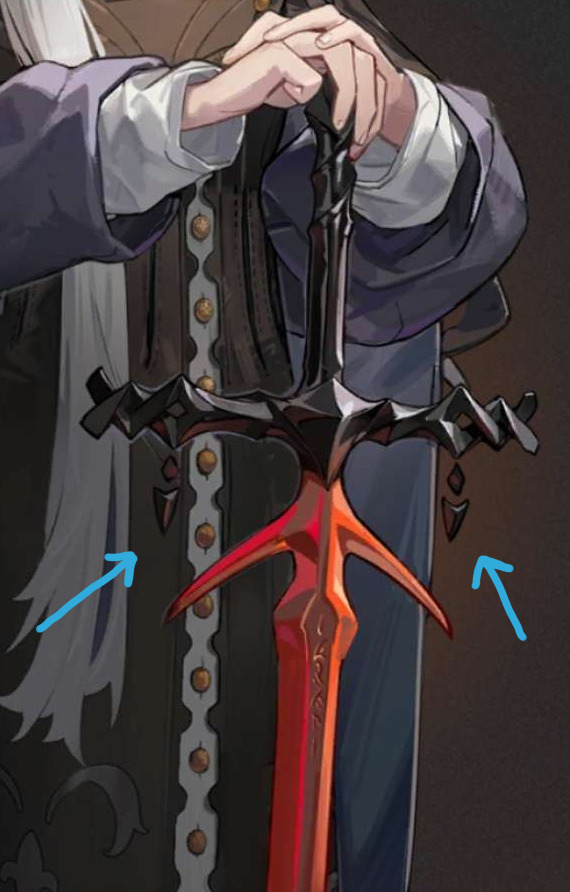
On Dikke's items, we also get the name and description for the sword.
The name alone leads me to believe that Dikke's weapon and its design represents both the sword and the scales of Lady Justice, it's the totality of justice itself. Dikke WIELDS justice, she ENFORCES justice, she IS justice. You're going to get really tired of me repeating the word justice in this post, but bear with me!
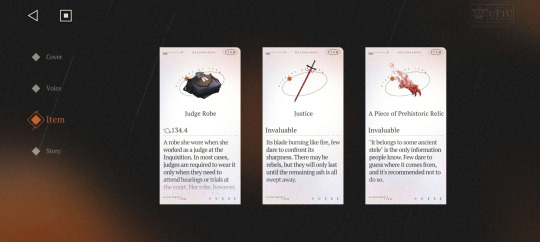
On the subject of swords, there are two swords mentioned all throughout Dikke's in-game profile and information. Her insight 2 garment is titled "Sword of Hamurabi".
This is evocative of something called the "Code of Hammurabi", one of the longest legal texts dating back to the first dynasty of Babylon. According to wikipedia, this stele it also depicts yet another deity of justice, Shamash. Wikipedia also makes note of the prologue within the Code of Hammurabi, in which the author - Hammurabi - claims to have been given these rules "to prevent the strong from oppressing the weak". This is extremely relevant to Dikke, as someone who fought hard for the rights of arcanists.
Pandora Wilson: I have heard many legends about you. The violent ghost of punishment, the crime-slaying sword of execution, the goddess of justice, the people's savior... Dikke: The desperate always need hope.
The stele of the Code of Hammurabi is ALSO relevant, because the artifact that follows Dikke around explicitly "belongs to some ancient stele". Yet another object that embodies justice and law.
I won't pretend I know anything about Babylonian culture or history in general, so anyone with more insight on this is welcome to add on to details and corrections!
The second sword mentioned can be found in the title for her 02 Story - "The Sword of Damocles".
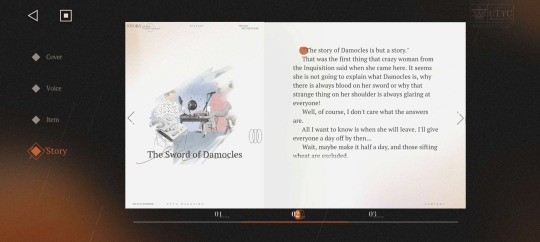
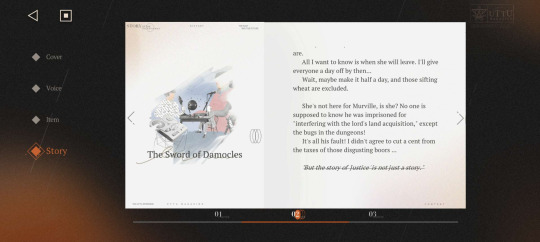
This excerpt seems to be written by one of Dikke's coworkers, perhaps someone in a higher position of power since they mention being able to give others a day off. Overall, we're reading the thoughts of someone who is abusing their power and who does not think highly of Dikke.
"The story of Damocles is but a story" is something that Dikke herself says. At the end, there's a different phrase written and crossed out - "But the story of justice is not just a story".
Now, the anecdote of Damocles talks about how positions of authority and power are double-edged swords - a king may have all the riches and fortune in the world, but also be burdened with the anxiety of knowing there might be someone plotting against him. In the story, Damocles switches places with king Dionysus, to know what it's like to be a king, but to really make Damocles understand the position of king, a sword is placed above him - one that can fall and kill him at any moment.
With this in mind, Dikke's 02 Story becomes more clear - the first phrase is a warning given by Dikke herself to those in positions of power. The story of Damocles is a story, because not everyone will understand the consequences of being in a position of power. Not everyone will be given the opportunity to even reach such a position.
The author of the 02 Story is not a good person, only considering the idea of giving people HALF a day off, excluding those who work on the fields who will get nothing, refusing to lower taxes for the poor, and imprisoning someone who "interfered with the lord's land acquisition".
The sword of Damocles is also used to allude to the impending tragedy for those in positions of power, caused by the smallest of catalysts. So it makes sense to me that the final phrase, the one crossed out at the end, was either written by Dikke or alludes to the demise of this author at her hand.
And while we're at it, might as well talk about the last remaining item - her robes. Judges are required to wear these when working on trials, but Dikke is specifically stated to wear them outside of them - because she's always imparting justice. She's the opposite of Oliver Fog, she's always on the clock.
We haven't even gotten to another big aspect of Dikke's character - the fact that she's part of the Inquisition.
Without getting too much into actual historical events, the Inquisition as we know it focused on heresy and the conversion and persecution of Jews and Muslims. Within the game, this is recontextualized as a focus for arcanists instead. It's worth noting that her 01 and 02 Stories are written from the perspective of those who are in support of the Inquisition and its practices, or who profit from abusing their own power - hence the wording of "the Inquisition has been abused and considered evil by the ignorant."
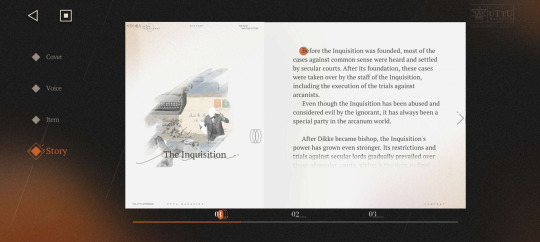
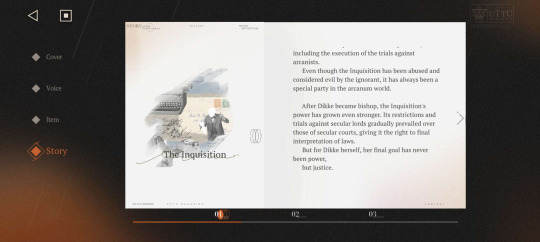
There is an emphasis on how the Inquisition seeks power, while Dikke's final goal is justice.
This whole thing and yet another part from her interview with Pandora Wilson, is related to how Dikke associates herself with the corrupt and allows people to view her as a needlessly violent person for the sake of setting things right. On one hand, she could associate with the Inquisition and become a bishop to destroy corruption from inside out - on the other, she could acknowledge that to impart justice, one needs power because they're things that go hand in hand. The Inquisition is only able to have this much influence over trials for arcanists because of the common hatred towards arcanists throughout history.
The interview revolves around all the rumours surrounding Dikke, and we can see her showing distaste at the idea of cooperating with "what [she] shouldn't allow for the sake of justice" while at the same time, not denying her involvement with them. All the things she does are a means to an end.
Pandora Wilson: Does that mean you will cooperate with what you shouldn't allow for the sake of "justice"? Dikke: Fie. Pandora Wilson: Is that supposed to be a secret? Dikke: It sounds like we are talking about a conspiracy, yet it is but a means.
As for Dikke's own relationship with justice and her personal views outside of all the historical references used to create her character, I think this voiceline she has pretty much sums things up nicely.
Everything I doth… is so I may enjoy this calm wind on nights like this, rather than hear the sorrowful cries and moans of unhappiness.
She's a character that is strict in her ways and doesn't shy away from the darker aspects of life, such as the injustice arcanists have been subjected to for centuries. This extreme focus she has for upholding justice does cause Dikke to appear cold, and yet her ideals are almost childish, pure even - a world in which all misdeeds are punished and all good people are heard. Hell, her Ultimate literally purifies all negative statuses.
Dikke could easily lean towards righteous characters who exclusively see things as black or white, yet many of her voicelines and the origin of her devotion, show a very gentle heart. This is made clear by the fact that she's a healer.
Her two attacks and their names speak volumes about her own ways of thinking. Power is violent, power is not something that a judge should have so carelessly, but it is allowed in the name of "justice". Justice in quotations.
And then, actual justice is a rare occurrence, being merciful is not something that rules and the law take into account, but it's needed for those who cannot defend themselves.
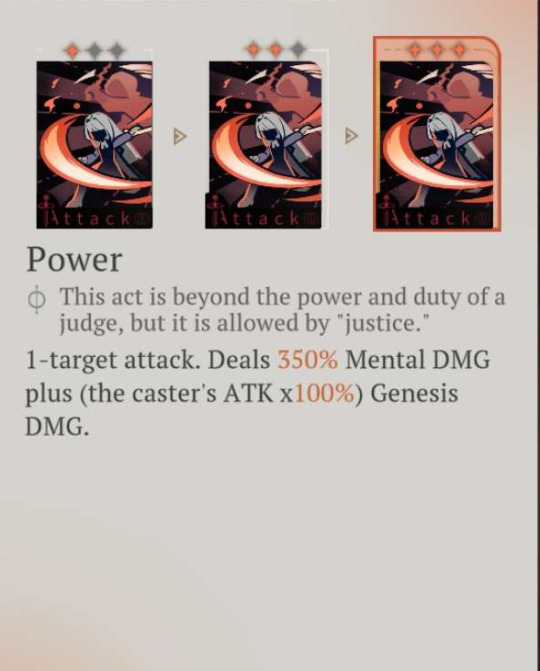

On the subject of Dikke's backstory.
There's no resolution to this point, it just came up randomly while writing the previous one, because it just hit me that Dikke's Cover profile does not list where she was born. And that got me thinking about the fact that before settling down, she traveled all around Europe.
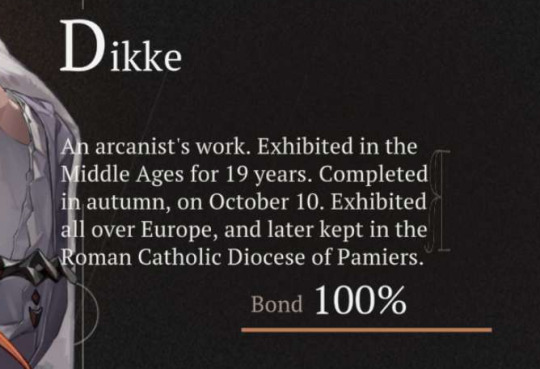
First of all, the Roman Catholic Diocese of Pamiers is an extremely specific location - one that has ties to the Inquisition, as a very important document regarding the Inquisition's procedures during a very specific trial was found there, as far as I know with my surface level research into history references. This document also talked about how, within this trial, the inquisitor and the bishop had "almost equal responsibility".
We can assume that this is the place where Dikke became bishop officially, if this was her final destination.
This starts to fall within headcanon territory, since it's mostly speculation, but I feel that the 02 Story takes place before she becomes bishop and settles in Pamiers - as a member of the inquisiton, she must've traveled all over Europe to do her job.
There might also be something related to the name mentioned, "Murville", but I don't have time nor the brain to start connecting the dots with actual french history. All in all, I like to think that Dikke was given the position of bishop as an attempt to distance her from, you know, killing every single corrupt person in a position of power by keeping her in a single place.
None of her voicelines give away anything about her life prior her entire journey of justice, as far as I can tell.
If we take Dikke's ties with Joan of Arc, maybe she was a common girl roped into things beyond her control. But I personally don't like the interpretation of Dikke's ideals being born from divine intervention instead of her own experiences, seeing the crimes committed against arcanists and realizing that she would like to do something about it.
Another option I'd like to explore about her background - maybe Dikke did have a relatively safe and normal childhood, away from the stigma and persecution. A nice, gentle life that she willingly gave up after she was confronted with the reality of the state of the world, without Jean of Arc's holy realization. To me, there needs to be an emphasis on Dikke's choice and decision to fight corruption. Making this dedication a result of "God told me to do this" would render her a little shallow - not to say religion cannot be part of her character, but in my opinion, Dikke is best when the focus of her moral compass is a genuinely care for the weak and the defenseless.
On the subject of Dikke and the loss of humanity.
Yes, that's THREE characters in a row that I analyze and that have themes of loss of humanity. There's just so many characters who've lost or given up their own humanity for the sake of something greater or something wicked.
Pavia's was a result of how he was mistreated and as a way to reclaim power, Forget Me Not's was a self-imposed torture originating from his inability to take responsibility. Dikke's seems to be self-imposed as well, but unlike the previous two, her loss of humanity is more of a sacrifice she makes for the greater good.
In her voicelines, we see that she leads a very strict schedule - she's straightforward and curt (but never impolite!) with Vertin, alluding to how simple justice is (if one commits a crime or abuses power, they shall be dealt with regardless of their social status) and how her body is "a representation of justice". Dikke has become a symbol for an idea, the concept of a fair system - she is no longer an individual but a savior, an executioner, a violent ghost, a witch, a threat, etc etc.
The loss of humanity is obvious in the way we do not get to know Dikke outside of any themes regarding justice. It's extremely hard to gleam any information about her childhood, her family, her interests and so on because they've all been displaced by this identity as justice itself. To me, this speaks about how power and responsibility on this scale will inevitably separate you from the people, THIS is the Sword of Damocles, now applied to Dikke as much as it applies to those in line for her judgement.
And yet, there are still very small hints of humanity left within her (still related, in a way, to her goals) in her care for the weak. Dikke's quote on her hobbies in a way reminds me of Sonetto.
The idle chatter of the people is entertaining, but 'tis more entertaining that they are always the first to know about the corrupt behavior of nobles.
Sonetto is a character that is similar to Dikke, in the sense that they both became the embodiment of concepts that ultimately stripped them off their individuality. Sonetto by fulfilling her training at the Foundation and becoming the PERFECT example of a military dog, a child martyr who struggles to connect with others because she was only taught how to exist FOR the Foundation. And Dikke, by all the things mentioned before.
But both of them have very endearing hobbies. Sonetto reads newspapers and collects them to find TYPOS IN THEM. Dikke's hobby is to listen to people talk as they go on about their day, not gossiping but to just listen to people exist.
In the main story, Sonetto's upbringing causes her to have a barrier with the people she truly wants to connect to (Vertin, namely) and Dikke's goal causes her life to revolve around a single thing, now only able to engage in mundane things from an outsider's perspective. She listens to people, she doesn't talk to them. She protects people, she doesn't live among them.
I like to think that, even so, this is when Dikke is most at peace. That she enjoys people watching, knowing they're safe and sound - because it validates all her efforts, it means that what she's doing is, in the end, worth it. This might also be why Dikke tells Vertin that they might be on the same path - Vertin, slowly figuring out the truth behind the Foundation and Manus Vindictae and acting as a saviour for those stuck in the middle.
As for headcanons, here's a couple I have!
Dikke has such a dry and deadpan sense of humour that only Vertin can understand it.
Sometimes, very rarely, Dikke will chime in with the most outlandish reply - straight out of the blue, spoken in the most serious and monotone voice. Those who aren't close to her will most likely brush it off as yet another intimidating thing they can't understand about her, but those close to her like Vertin?
It's THE funniest shit in the world and Dikke, who is very aware of the image and respect she commands, knows it.
Dikke and the artifact that follows her are friends.
Quite literally, that thing is the hand of justice. I like to think that Dikke can communicate with it non-verbally, even though it's implied that the artifact is not created by her arcanum.
Part of me likes to think that Dikke insists on said artifact being just her partner in her long journey of bringing justice to the world, but due to all the years spent together and all, the artifact itself (and whatever entity that shows up in her Ultimate) have come to see Dikke as their protégé.
#reverse 1999#reverse: 1999#reverse 1999 headcanons#reverse 1999 dikke#dikke#yes im flexing my 100% bond with her in that screenshot#i only have 3 characters at max bond and its pavia zima and dikke LMFAO
107 notes
·
View notes
Text
tuesday again 8/20/2024
a little light this week bc i had a fairly wretched week, medically speaking
listening
hozier's nobody's soldier would have been on every 8tracks mix for every character. THEEEEE blorbo song of all time to the point i am already annoyed at the thought of seeing it on every spotify mix. fuckin owns tho. very fun mod sixties heist taste to the horn arrangement
youtube
-
reading
thank you philip.
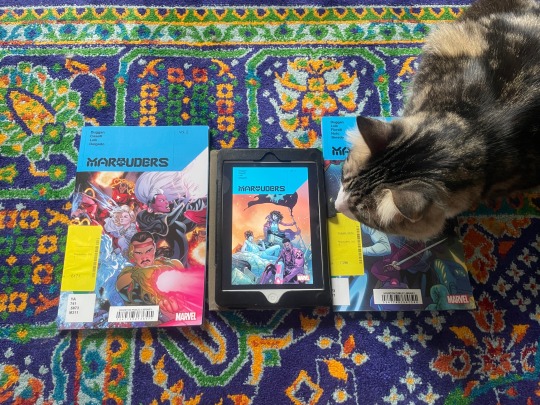
polished off the Marauders (2019-2022) comics. i liked the first volume way more than these three-- they didn't quite deliver the same quality of art or swashbuckles-per-minute. also this was probably not a great choice for someone who has forgotten what little she once knew about the xmen, even though they came at the beginning of a reboot.
why did i read these? mostly bc they were readily available or with short wait times at my library and my bestie is making me watch all the xmen movies. a girl gets curious about comic books sometimes
surprisingly, i came across this one from the Pocket integration on the firefox new tabs
McDonald likens the functions of Spotify to Google Maps. “Google Maps doesn’t do the exploration for me, but it’s helpful if I go somewhere,” he says. Rather than taking us on guided tours, it provides the tools for us to navigate somewhere new. Much as it shows us what’s nearby and how to get there, and flags notable landmarks others have visited, Spotify helps us access most music, lists global listening trends, and introduces us to artists similar to those we already know. But it’s communities that help us home in on a destination Spotify can help us explore.
part two of breaking down infamous academic paper mill Hindawi and why it was bought by Wiley anyway bc they did seemingly no due diligence, bc as a whole they do very little actual work in the publishing process.
i have included a very long quote bc it is one of only two things that made me genuinely laugh out loud this week (the other was phil unsticking a claw from the couch by backflipping herself out)
One issue of Wireless Communications and Mobile Computing from 2022, edited mostly by Hamurabi Gamboa Rosales, took an average of about 20 days to go from initial submission to revision submission. This is not unlikely, it’s impossible. The easiest way to explain this is with an analogy. Say there’s a pothole outside your house, and you call the council. You tell them ‘there’s a big hole in the road outside my house!’ The person at the other end, rather than tiredly telling you to fill out a form - which is what councils do all over the world, in my experience - instead yells ‘MOTHER OF GOD! WE’RE RIGHT ON IT!’ Twenty minutes later, a bitumen truck comes HURTLING around the corner of your street at full send, with the road workers hanging out the back of it, the driver leaning on the horn and yelling ‘GET OUT OF THE WAY! POTHOLE!’ They pull up outside your house, and you see the brakes go hot. But the guys don’t even wait for it to stop, they jump off while it’s slowing down, and they grab pry bars and a burner and a kettle of bitumen, and they start hammering out the edges, pour the bitumen and start slamming it with hammers almost at the same time. In about six minutes, the hole is filled and flattened, and they admire their work for about four hundred milliseconds and SCREAM off the way they came. No sooner has the truck disappeared, then your phone rings - and it’s the council worker from before. ‘POTHOLE! *pant* *pant* FIXED! Happy to be of service!’ *click* That’s how likely the entire editorial process taking 20 days is.
-
watching
i don't understand why the third xmen movie isn't named x cubed. it extremely is not their last stand there are like a dozen more movies to go. gun to my head i could not tell you what happened in this one. whatsherface did look good as hell though

and now for the movie i actually want to talk about, Monkey Man (2024, dir. Patel). imdb says:
An anonymous young man unleashes a campaign of vengeance against the corrupt leaders who murdered his mother and continue to systematically victimize the poor and powerless.

i am so so so lucky that my favorite kind of fight scene — fast, brutal, right spaces with improvised weapons-- is fashionable. pour it DIRECTLY into my open mouth
i think i generally agree with a broad sweep of reviewers here when i tell you that this movie is gorgeous and grossnasty at the same time, there are a lot of ideas that aren't all quite resolved, and i am much more interested in why it has a hell of a lot of ideas (part of why they don't all get resolved).
patel's first movie, it feels very much like a movie of someone who isn't sure they'll be able to do another one, so throw everything you've got in here. a sort of famously rocky production and shoestring budget, but you would not know it. the club scenes are especially dripping in glitz and, like many stage productions, have a lot of clever editing and strategic deployment of mirrors and repeats. there's a fight scene with hanging mirrors near the end where the mirrors can't have been more than fifty bucks each but it looks SO fucking sick.
i am much more willing to go to bat for this movie and ignore some of the rough edges bc it is so refreshingly earnest, and despite the style references, is very focused on being its own thing. at some points it's going to feel like The Matrix (1999, dir. the Wachowskis) bc every movie made in a post- The Matrix (1999, dir. the Wachowskis) world is going to feel a little bit like The Matrix (1999, dir. the Wachowskis). or like when the above gif happened in the movie it did not make me want to turn it off and go watch the first john wick.
people who live in india or are part of the diaspora are a little cranky about the political parties of the film, which had to be neutered for release. while i don't think i would have grasped all the nuances even if we did have the original cut, i think it's likely some of the characters would have resolved a little cleaner if that original intent was still there.
why did i watch this? i think patel is easily as hot as tumblr darling mifune. while drafting this post i got distracted sooooooo many times trying to pick the perfect gif. some of them are too hot!!!
-
playing
fallow week
-
making
just stayin alive! just livin the fuckin dream!!!
26 notes
·
View notes
Text
The Sumerian Game is an early text-based strategy video game of land and resource management. It was developed as part of a joint research project between the Board of Cooperative Educational Services of Westchester County, New York and IBM in 1964–1966 for investigation of the use of computer-based simulations in schools. It was designed by Mabel Addis, then a fourth-grade teacher, and programmed by William McKay for the IBM 7090 time-shared mainframe computer. The first version of the game was played by a group of 30 sixth-grade students in 1964, and a revised version featuring refocused gameplay and added narrative and audiovisual elements was played by a second group of students in 1966.
The game is composed of three segments, representing the reigns of three successive rulers of the city of Lagash in Sumer around 3500 BC. In each segment the game asks the players how to allocate workers and grain over a series of rounds while accommodating the effects of their prior decisions, random disasters, and technological innovations, with each segment adding complexity. At the conclusion of the project the game was not put into widespread use, though it was used as a demonstration in the BOCES Research Center in Yorktown Heights, New York and made available by "special arrangement" with BOCES into at least the early 1970s. A description of the game, however, was given to Doug Dyment in 1968, and he recreated a version of the first segment of the game as King of Sumeria. This game was expanded on in 1971 by David H. Ahl as Hamurabi, which in turn led to many early strategy and city-building games. The Sumerian Game has been described as the first video game with a narrative, as well as the first edutainment game. As a result, Mabel Addis has been called the first female video game designer and the first writer for a video game. In 2024 a recreation of the game, based off of the available information, was released for Windows.
2 notes
·
View notes
Text




Got some pretty fun stuff at NDK 2024.
- A cool Geats IX playmat
- Famicom SDGundam 4
- PBandai HG Aqua Hamurabi 2
- A couple of Dorothy charms
2 notes
·
View notes
Photo

Retro Game Spotlight 089: Kingdom (1980)
Publisher: Atari Platform: Atari 400/800 Box Art: Cliff Spohn
Trivia: A text-based strategy game originally written for the DEC PDP-8 in 1974 by Lee Schneider and Todd Voros, Kingdom is itself a variant of the 1968 game Hamurabi developed by Doug Dyment for the FOCAL programming language.
#Atari#Atari 400#Atari 800#Kingdom#box art#Cliff Spohn#video games#retro gaming#retro computing#Retro Game Spotlight
27 notes
·
View notes
Text
Arcanist | Dikke
The judge of the Special Court.
She often uses radical methods to uphold her justice. A lord? A king? Whoever it is, she'll not act against justice. "If a greedy hand commits a crime, it shalt be cut off."
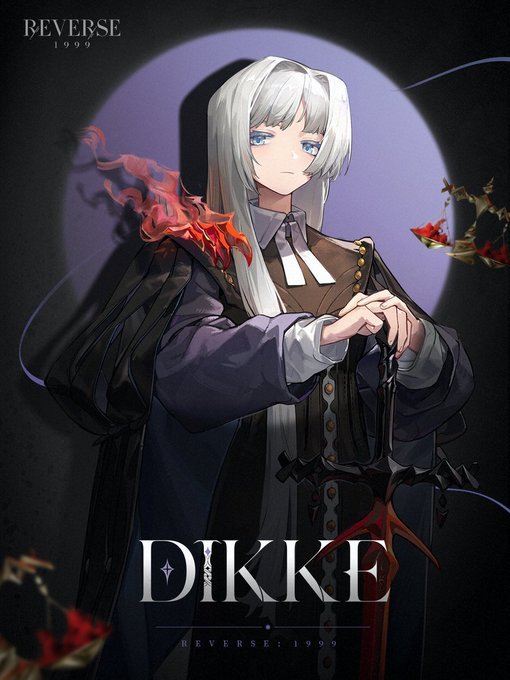
Storyboard | Dikke "Silence. ...Speak. From whence dost thou hail and what is thy purpose?"
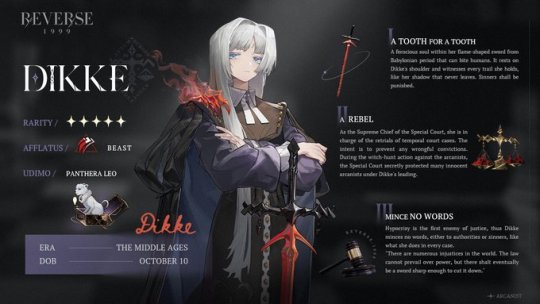
Garment | Dikke
Sword of Hamurabi
Her heart is as clear as a mirror and her sword shall slay all injustices.
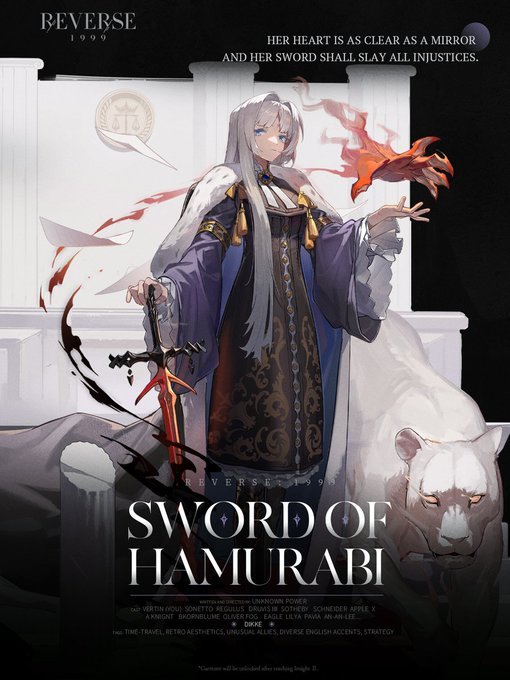
Arcane Skills | Dikke Dikke is a Beast healer and DPS. Her arcane skills deal Mental DMG. Her ultimate attacks 1 target and deals both Mental DMG and Genesis DMG.
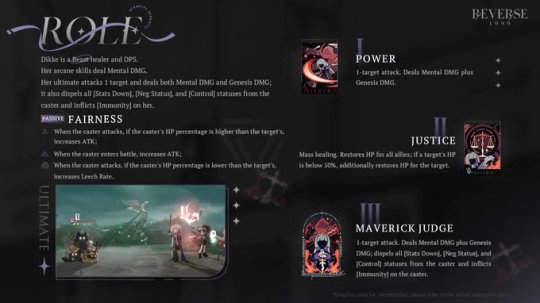
5 notes
·
View notes
Text
Durante a história, é perceptível a necessidade de ter um conjunto de regras, pois o que conhecemos hoje por Constituição foi sendo desenvolvida ao longo dos anos. Contudo, houve três ordenamentos, três espécies de códigos que fizeram muito efeito e trouxeram leis em comum para a coletividade: O Código de Hamurabi; O Código de Manu e o Código Mosaico.
3 notes
·
View notes
Text
Wife genuinely torn between enjoying the seanwhite scenes (I knew they would grew on her) and the need to cite the code of Hamurabi to me
3 notes
·
View notes
Text
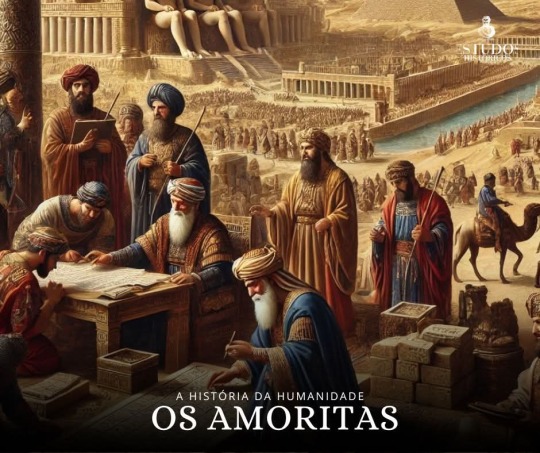
Os Amoritas foram um povo seminômade de origem semita que desempenhou um papel fundamental na história do Oriente Médio Antigo, especialmente durante o segundo milênio a.C. Eles surgiram na região da Síria e Mesopotâmia e, ao longo do tempo, tornaram-se protagonistas na formação de importantes reinos e impérios, incluindo a Babilônia sob o governo de Hamurabi.
Os Amoritas aparecem nos registros sumérios por volta do final do terceiro milênio a.C., sendo frequentemente mencionados como povos nômades das estepes ocidentais. Os sumérios os chamavam de **"Martu"**, o que tinha uma conotação pejorativa, retratando-os como bárbaros sem cultura ou cidades fixas. No entanto, essa visão não capturava toda a complexidade dessa civilização emergente.
A partir do colapso do Império de Ur por volta de 2000 a.C., os Amoritas começaram a se infiltrar na Mesopotâmia. Algumas cidades-estados importantes, como Mari, Larsa, Assur e Babilônia, caíram sob seu domínio, marcando o início de uma nova era na política mesopotâmica.
Entre as cidades conquistadas pelos Amoritas, a mais importante foi **Babilônia**, que se tornaria um grande império sob o rei Hamurabi (r. 1792–1750 a.C.). Ele foi responsável por expandir o domínio da Babilônia, consolidando um império centralizado e elaborando um dos códigos legais mais famosos da Antiguidade: o Código de Hamurabi. Esse código é um dos primeiros conjuntos de leis escritos da história e reflete a influência amorita na organização social e jurídica da Mesopotâmia.
Embora inicialmente fossem nômades, os Amoritas rapidamente adotaram a cultura mesopotâmica, preservando e promovendo a escrita cuneiforme, a religião e as tradições sumérias e acadianas. Seus governantes incorporaram deuses locais às suas crenças e patrocinaram grandes construções, templos e fortificações.
Eles também desempenharam um papel importante na diplomacia da época, interagindo com povos vizinhos, como os hititas, os elamitas e os egípcios. O comércio e a guerra eram partes essenciais de suas estratégias de sobrevivência e expansão.
O domínio amorita começou a declinar a partir do século XVI a.C., quando os cassitas invadiram a Babilônia e estabeleceram uma nova dinastia. No entanto, sua influência não desapareceu completamente. Elementos da cultura e da administração amorita continuaram a ser usados por civilizações posteriores da Mesopotâmia, incluindo os assírios e os caldeus.
O legado dos Amoritas pode ser observado principalmente na ascensão da Babilônia como potência mundial, na consolidação das tradições mesopotâmicas e no desenvolvimento da lei escrita. Apesar de sua origem como um povo nômade, eles moldaram profundamente a história da Mesopotâmia e do Oriente Médio Antigo.
Os Amoritas, assim, demonstram como povos considerados "bárbaros" por civilizações estabelecidas podem, com o tempo, tornar-se os próprios criadores de impérios e culturas duradouras.
(Estudos Históricos)
0 notes
Text
Ah yes, „hobby lobby‘s hamurabi robbing hobby“
ngl I keep forgetting that Hobby Lobby is a real store that people go to. That people actually think of it as a craft store and not as a crazy Christian mass artifact smuggler. I google "Hobby Lobby" and get a page full of results that make me go "wtf is this craft supplies and operating hours shit, I thought we all knew this place for smuggling looted cuneiform tablets out of Iraq"
34K notes
·
View notes